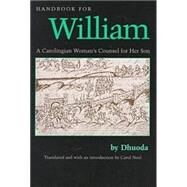- ISBN: 9780813209388 | 0813209382
- Cover: Paperback
- Copyright: 4/1/1999
"I send you this little book written down in my name that you may read it for your education, as a kind of mirror."
So wrote the Frankish noblewoman Dhuoda to her young son William in the middle of the ninth century. Intended as a guide to right conduct, the book was to be shared in time with William's younger brother. Dhuoda's situation was poignant. Her husband, Bernard, the count of Septimania, was away and she was separated from her children. William was being held by Charles the Bald as a guarantee of his father's loyalty, and the younger son's whereabouts were unknown. As war raged in the crumbling Carolingian Empire, the grieving mother, fearing for the spiritual and physical welfare of her absent sons, began in 841 to write her loving counsel in a handbook. Two years later she sent it to William.
Handbook for William memorably expresses Dhuoda's maternal feelings, religious fervor, and learning. In teaching her children how they might flourish in God's eyes, as well as humanity's, Dhuoda reveals the authority of Carolingian women in aristocratic households. She dwells on family relations, social order, the connection between religious and military responsibility, and, always, the central place of Christian devotion in a noble life.
One of the few surviving texts written by a woman in the Middle Ages, Dhuoda's Liber manualis was available in only two faulty Latin manuscripts until a third, superior one was discovered in the 1950s. This English translation is based on the 1975 critical edition and French translation by Pierre Riche. Now available for the first time in paperback, it includes an after-word written by Carol Neel that takes into account recent scholarship andthe 1991 revised edition of Riche's text.







